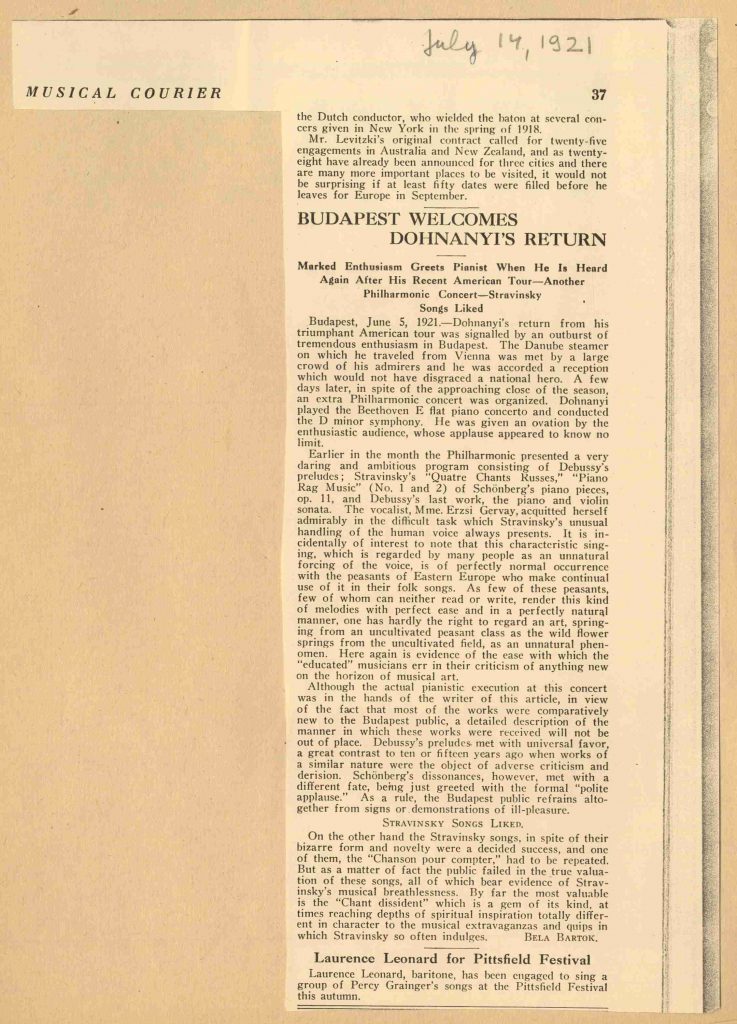“Budapest Welcomes Dohnanyi’s Return”, Musical Courier, LXXXIII/2 (14 July 1921), 37.
Collected edition: DocB/5, 108–112.
Source: BBA

BUDAPEST WELCOMES DOHNÁNYI’S RETURN Marked Enthusiasm Greets Pianist When He Is Heard Again After His Recent American Tour – Another Philharmonic Concert – Stravinsky Songs Liked
Budapest, June 5, 1921. – Dohnányi’s return from his triumphant American tour was signalled by an outburst of tremendous enthusiasm in Budapest. The Danube steamer on which he traveled from Vienna was met by a large crowd of his admirers and he was accorded a reception which would not have disgraced a national hero. A few days later, in spite of the approaching close of the season, an extra Philharmonic concert was organized. Dohnanyi played the Beethoven E flat piano concerto and conducted the D minor symphony. He was given an ovation by the enthusiastic audience, whose applause appeared to know no limit. Earlier in the month the Philharmonic presented a very daring and ambitious program consisting of Debussy’s preludes; Stravinsky’s “Quatre Chants Russes,” “Piano Rag Music” (No. 1 and 2) of Schönberg’s piano pieces, op. 11, and Debussy’s last work, the piano and violin sonata. The vocalist, Mme. Erzsi Gervay, acquitted herself admirably in the difficult task which Stravinsky’s unusual handling of the human voice always presents. It is incidentally of interest to note that this characteristic singing, which is regarded by many people as an unnatural forcing of the voice, is of perfectly normal occurrence with the peasants of Eastern Europe who make continual use of it in their folk songs. As few of these peasants, few of whom can neither read or write, render this kind of melodies with perfect ease and in a perfectly natural manner, one has hardly the right to regard an art, springing from an uncultivated peasant class as the wild flower springs from the uncultivated field, as an unnatural phenomen. Here again is evidence of the ease with which the “educated” musicians err in their criticism of anything new on the horizon of musical art. Although the actual pianistic execution at this concert was in the hands of the writer of this article, in view of the fact that most of the works were comparatively new to the Budapest public, a detailed description of the manner in which these works were received will not be out of place. Debussy’s preludes, met with universal favor, a great contrast to ten or fifteen years ago when works of a similar nature were the object of adverse criticism and derision. Schönberg’s dissonances, however, met with a different fate, being just greeted with the formal “polite applause.” As a rule, the Budapest public refrains altogether from signs or demonstrations of ill-pleasure. STRAVINSKY SONGS LIKED. On the other hand the Stravinsky songs, in spite of their bizarre form and novelty were a decided success, and one of them, the “Chanson pour compter,” had to be repeated. But as a matter of fact the public failed in the true valuation of these songs, all of which bear evidence of Stravinsky’s musical breathlessness. By far the most valuable is the “Chant dissident” which is a gem of its kind, at times reaching depths of spiritual inspiration totally different in character to the musical extravaganzas and quips in which Stravinsky so often indulges. BÉLA BARTÓK.